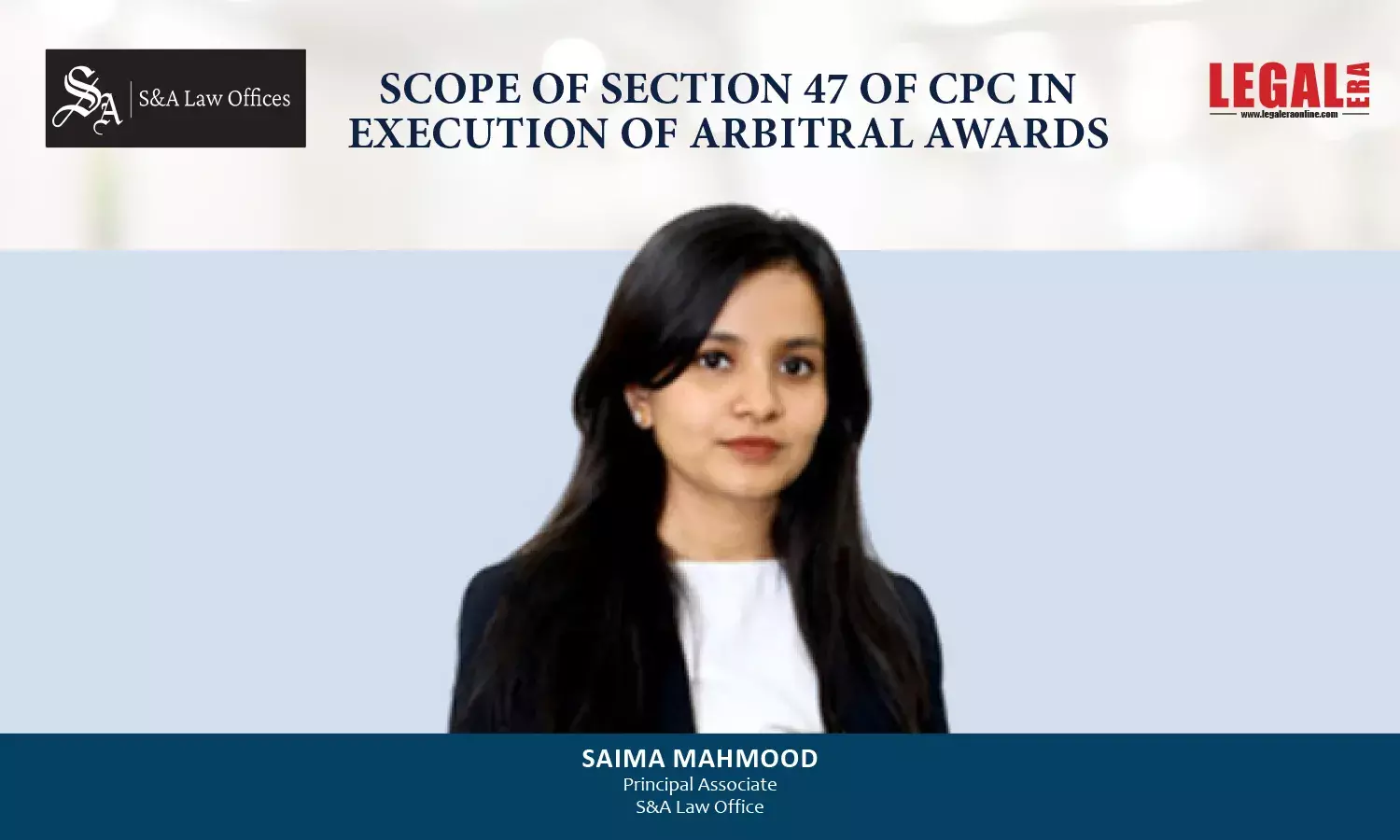Scope Of Section 47 Of CPC In Execution Of Arbitral Awards

Scope of Section 47 of CPC in Execution of Arbitral Awards
Introduction
The power of the Executing Court under Section 47 of the Civil Procedure Code, 1908 (‘CPC’) is microscopic, to be used judiciously and not sparingly. Section 47 of CPC governs the scope of judicial intervention by an Executing Court. In most cases, Section 47 of CPC becomes a tool for delaying the process of justice, hence it becomes essential that the Executing Court only divulge itself in the question of validity of decree, when the same is apparent from the face of it or is prima facie evident. The Executing Court question shall not travel the course and dismiss the case on merit. Section 47 of CPC cannot be construed as an appeal under the garb of objection. The Section envisages as follow:
Section 47 CPC: Questions to be determined by the Court executing decree
(1) “All questions arising between the parties to the suit in which the decree was passed, or their representatives, and relating to the execution, discharge or satisfaction of the decree shall be determined by the Court executing the decree and not by a separate suit….
The provisions itself envisages that the Executing Court has the power to adjudicate on all questions arising between the parties pertaining to the execution, discharge or satisfaction of the decree. It was observed by the Hon’ble Supreme Court that powers of the court under Section 47 of the CPC are different and very narrower than those in appeal, review or revision.

The exercise of power under Section 47 of the CPC microscopic in nature and shall be used judiciously which lies in a very narrow inspection hole. It is within the powers of an executing court to allow objection to the executability of the decree. Allowing such an objection requires the party to demonstrate that the decree is void ab initio and a nullity, independent of the argument that it cannot be carried out in accordance with the law because it was passed without knowledge of the relevant provision or because the law was enacted after the decree was passed and rendered inexecutable.
Limitations of an Executing Court
It is fundamental principles that a decree passed by a court without jurisdiction is a nullity and that it is invalidity could be set up whenever and wherever it is sought to be enforced or relied upon. A power or jurisdiction that does not exist or vest in a court is said to be inherent lack of jurisdiction. When the subject matter is completely outside of the court's purview and has no connection to its acknowledged jurisdiction, the court lacks inherent jurisdiction.
Additionally, a defect in jurisdiction whether it is pecuniary or territorial, or whether it is in respect of the subject matter of the action, strikes at the very authority of the Court to assess any decree and such defect cannot be cured even by consent of parties1.
Further in Urban Improvement Trust, Jodhpur vs. Gokul Narain, Hon’ble Supreme Court observed that a decree passed by a Court without jurisdiction over the subject- matter or on any other ground which goes to the root of its exercise of jurisdiction or inherent jurisdiction, is a nullity. Its invalidity can be set up whenever it is sought to be enforced or is acted upon as a foundation for a right even at the stage of execution or in collateral proceedings. The defect of jurisdiction strikes at the authority of the Court to pass a decree which cannot be cured by consent or waiver of the party2. Hence the law is amply clear that execution cannot be refused except in case of nullity.
Impact on Arbitral Award
It is trite law that the Arbitration & Conciliation Act, 1996 (‘the Arbitration Act’) is a complete code by virtue of non-obstante clause i.e. section 5 and the Courts cannot travel beyond the same. It becomes imperative that we explore the powers of an Executing Court emanating from the Arbitration Act, especially in light of Section 47 of the CPC. Whether the Executing Court has power to nullify arbitral award under Section 47 of the CPC or challenge to an arbitral award can only be under Section 34 of the Arbitration Act.
The Scope of Section 34 of the Arbitration Act cannot be interlinked or overlapped with powers of an Executing Court under Section 47. Section 34 of the Arbitration Act is a tool to challenge the award under the ground envisaged in the section itself. However, the Executing Court role is distinct in nature wherein the role is to ascertain that the award which is being executed is neither void, null nor non-est in law. The design of Section 47 of CPC ensures fairness, transparency, impartiality and upholding principles of natural justice within arbitration regime as well.
A glance of Section 36 of the Arbitration Act clearly provides that the right of Award-Holder to seek enforcement/execution of award is subject to provisions of the Code of Civil Procedure, 1908 i.e. CPC and “in the same manner as if it were a decree of the court”. Thus, there lies no dispute between both the Arbitration Act and CPC. Infact, Arbitration Act envisages the execution of the award as prescribed under CPC and determined by an Executing Court and that there shall be no sperate suit for this purpose.
In State of UP v. Raj Veer Singh3, the Allahabad High Court while discussing the challenges of Section 47 under execution of arbitral award, observed the following4:
- The jurisdiction is limited to matters pertaining to execution of the decree.
- The validity of a decree cannot be looked into by the executing court unless the decree suffers from inherent lack of jurisdiction.
- It is imperative for the Courts to guarantee that any objections under Section 47 of the CPC are limited to issues related to the execution, discharge, or compliance of the decree, and do not extend beyond its boundaries into substantive rights or legal questions.
Thus, there is clear demarcation of the power envisaged with the Executing Court while adjudicating under Section 47 of the CPC. The Hon’ble Supreme Court have also observed that to empower the Executing Court to consider and determine the questions relating to the execution of a decree, Section 47 of CPC must be interpreted liberally, unless it falls beyond its ambit of the Court demanding divulgence on question of law and question of fact5.
Conclusion
The power of Executing Court is three-fold, firstly, to not go beyond the bounds of the decree, secondly, to not question the correctness of the decree unless there is apparent ambiguity, thirdly, to ascertain whether the Arbitral Tribunal which passed the Decree/Award has inherent jurisdiction. More specifically, under Section 47 of CPC, it is the Executing Court’s duty to ascertain the three issues: Firstly, whether Decree/Award is not executable? Secondly, whether the Court/Arbitral Tribunal lacks inherent jurisdiction to pass the award? And thirdly, whether such inherent jurisdiction is apparent. Once the Executing Court has affirmative on the three issues, the award becomes non-executable.
The Hon’ble Supreme Court and High Court have allowed section 47 of CPC and dismissed the arbitral award on the grounds which include award passed by unilaterally appointed Sole Arbitrator6, lack of jurisdiction of the arbitrator is patent and ex facie clear7, Award is made by the arbitrator based on invalid reference to arbitrate8, Award is per se illegal9, Arbitration proceedings were conducted without giving an opportunity to the party to present their case, and copy of the award was also not furnished to that party to challenge the same,10 etc.
Thus, the power of the Executing Court under Section 47 of the CPC is very limited, and is to be applied judiciously and not sparingly. Section 47 of the CPC empowers the Court to not shut its eyes to a severe and grave irregularity that goes to the root of a decree or award. Extending the power of Section 47 of CPC to arbitral award cannot be considered as a dilution of the Arbitration Act but a reinforcement of the credibility of the arbitration process and safeguard of party autonomy. It fosters efficiency and fairness of arbitration as an alternative dispute resolution mechanism.
Disclaimer: This article was first published in the S&A Law Offices - 'Indian Legal Impetus' newsletter in August 2024.
2. AIR 1996 SC 1819
3. 2024 SCC Online All 1094.
4. Supra.
5. Sunder Dass Vs. Ram Prakash AIR 1977 SC 1201
6. Kotak Mahindra Bank Ltd. v. Narendra Kumar Prajapat 2023 SCC OnLine Del 3148
7. R.K. Textiles v. Sulabh Textiles Pvt. Ltd.,2002 SCC OnLine Bom 279
8. Prabartak Commercial Corpn. Ltd. v. Chief Administrator, Dandakaranya Project, (1991) 1 SCC 498
9. Public Works Department v. Prakash Constructions, 2019 SCC OnLine Mad 410, para 48(c)
10. J.K. Govindarajulu v. Sriram City Finance Ltd., 2020 SCC OnLine Mad 4697

